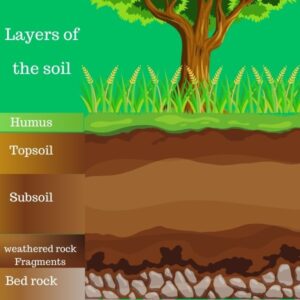Importance Of Humus Soil Creation For Agriculture

Did you know?
Soils with organic matter of minimum 3 to 5% are considered ideal for agriculture. And only top 4-12 inches of the earth’s crust contains humus soil that is available for existence of life on the earth.
This level of humus content provides numerous benefits such as improved soil structure, nutrient retention, water holding capacity, and support for beneficial microbial activity.
Did you also know?
That in most of the Indian agricultural soils, the humus content is way less than the required amount, as studies say that it ranges from 1-3%. In some areas where there is practice of intense farming where farming is done season after season continuously, the humus soil levels may be much lower.
Maintaining adequate levels of humus content is crucial for sustaining productive and profitable agricultural practice.

Understanding The Role Of Humus In Soil Health:
Research shows that only soils with very optimal structural tilt can have a humus soil content ranging from 8-10 percent. Some of the remotest forests in our earth where there is almost no human activity has humus soil content reaching upto 20 percent. This happens because the forests don’t use up all the organic matter that is generated over years and hence store them as humus. Such huge reserves of humus soil takes millions of years to form.
In the areas inhabited by the human population even though intense agriculture is not practiced the humus generated is almost entirely used by the existing plant population, let alone have some surplus of humus.
Almost all types of plants except the leguminous plants use up more humus than the amount of humus soil that they generate.
It is crucial for the soil to have a vital amount of humus content because, humus enhances the soil structure, increases water retention in the soil, promotes aeration in the soil by increasing the drainage. Humus soil is a rich reservoir of essential nutrients which supports plant growth and its vitality. Humus soil also helps in good microbial activity contributing to the soil health.
Thus Humus is rightly called as the “BLACK GOLD”.
What is Humus:
Humus is the dark organic matter present in the upper layer of the earth’s crust. Humus is formed by the action of microorganisms on plant waste (like dried and weathered leaves) and animal waste over a period of many years. These plant and animal waste are in their complex forms thus making it difficult for the plants to absorb them. when the microorganisms act on these waste, they are converted into humus. Though the exact chemical composition of Humus soil may vary, they are predominantly composed of 60% carbon, 10% nitrogen, phosphorus and sulphur in little quantities. We say a soil contains humus component when the carbon : nitrogen ratio is 10:1.
Did you know that 1 tsp of humus contains 100 billion microbes and microorganisms?
Characteristics of humus
- Humus is moist.
- Humus has a lot of oxygen.
- Humus is rich in earth metals.
- Humus has a long chain of organic molecules.
- Humus fosters an active ecosystem of fungi and insects.
- Humus is seen within 10cm to 30cm from top of the soil.
- When you look into the humus particles through microscope it looks like a sponge. The reality is, it acts like a sponge too by absorbing or retaining water.
- Humus even acts like a filter, filtering out the harmful chemicals leaching into the soil and eventually into the food that we eat.
- If there is 1% extra humus in 1 hectare of land then it can retain 1,70,000 litres of water.
- In a nutshell it forms a bridge between the soil and the plants.
What are the different ways to improve the humus content in soil?
1) Adding the organic matter:
The humus content in the soil can be increased by adding well decomposed organic matter. This organic matter can be from kitchen waste (like vegetable peels or leftover vegetables and fruits), crop residue which is obtained after harvesting, animal manure from cattle excretion can be added to the soil to increase the organic content of the soil. When there is sufficient organic matter in the soil, it decomposes over time by microbial activity thus releasing nutrients and forming humus.
2) Cover cropping:
Cover crops are those crops which are grown between main growing seasons. These cover crops contribute to the organic matter in the soil. During non growing season cover crops like some leguminous plants can be grown – this fixes nitrogen in soil and increases soil fertility. Some of the cover crops that can be considered are legumes like Cow peas(lobia), Pigeon peas(arhar), Green gram, millets like sorghum, pearl millets, finger millet, other crops like sun hemp, Sesbania, mustard etc.
3) Mulching:
Mulching is the process of covering the soil with bark, wood chips, straw and crop residues etc. When these break down it contributes to the organic matter in the soil, increases the microbial activity and thus contributes to the humus creation. This is possible as the mulch helps the soil to retain moisture, moderates the soil temperature and create the optimal temperature for humus creation. Mulching also helps to control weeds and improve soil quality.
4) Crop Rotation:
Rotating with different variety of crops over the growing season avoids depletion of certain types of nutrients from the soil. Also growing diverse crops of a region helps in releasing different types of organic compounds in the soil which in turn increases humus content.
5) Vermicomposting:
Vermicomposting is the process of using earthworms to decompose kitchen and garden wastes into nutrient rich compost which helps in increasing the humus content in soil. Vermicompost is particularly rich in humus because earthworms ingest the organic waste, partially digest it and excretes nutrient rich casting which when decomposed results in humus rich in nutrients.
6) Biofertilizers:
Using biofertilizers having Mycorrhizal fungi and Rhizobium bacteria help in increasing the humus creation. Mycorrhizal fungi form a symbiotic relationship with plant roots and increase their surface area of nutrient absorption. Rhizobium bacteria helps in fixing the atmospheric nitrogen into a form usable by the plants in leguminous crops. These micobial activities help in increasing the humus content in soil.
7) Avoid Excessive Tillage:
Excessive tillage can cause disruption in soil structure which leads to soil erosion and loss of organic matter. When the soil is tilled it exposes the organic matter for oxidation thus reducing its availability for humus formation. Excessive tillage disturbs soil microbial communities, reducing their ability to decompose organic matter and form humus.
8) pH Management in soil:
The optimal pH range of the soil suitable for plant growth should vary in-between 5.5 to 7.0; Neither too alkaline nor too acidic. It is essential to maintain this pH level in soil because the microbial activity is optimal in this range which helps in the decomposition of organic matter to create humus.
9) Water Management:
Implementing drip irrigation and rain water harvesting improves soil health by maintain adequate soil moisture. When there is adequate soil moisture it creates a conducive environment for microbial activity on the organic matter which helps in humus creation in soil.
10) Balanced Nutrient Management:
Using Organic fertilizers along with mineral fertilizers helps in slow release of nutrients for sustained growth. Organic fertilizers release the much required organic compounds into the soil. These organic componds decompose to form humus. The mineral fertilizers provide readily available nutrients for plants. The combination of organic and mineral fertilizer allows for more gradual release of nutrients and thus contributes to sustained plant growth.
Soil is alive as long as it has living microbial activity. Presence of humus in soil is a proof of adequate organic matter and presence of microbial activity on them. A soil rich in humus is alive and is essential for sustainable agricultural practice and increased yield.
